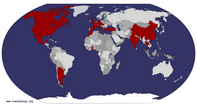One of my favorite travel websites doesn’t have a country summary of Rwanda. So here’s my version:
Intro: If you tell anyone you’re planning a trip to Rwanda, most people will think you’re absolutely mad. That goes to show the news hasn’t talked about what’s happened since the 1994 genocide. That is: it’s pulled itself together and actually put to good use the aid money that came in in the years following. For example, they have a goal to be completely internet-wired throughout the country by 2020. Yet there is still an undercurrent of paranoia, much like in Israel, thanks to the armed guards that wait on every corner of Kigali. There is peace right now, but my feeling is that it’s fragile. There are grenades that go off at the bus stations every few months, for example. And the anti-Tutsi movement is still alive and well just across the border in the DRC—the Democratic Republic of the Congo.
Rwanda is a country full of surprises. It’s the cleanest, most orderly African country I’ve visited. You can eat its salads with no worries of future indigestion. It’s stunningly beautiful, and infrastructure is paved.
There are also more white people in Kigali than in Accra.
Nevertheless it’s the last country I would want to live in all of our travels. Because of its lack of healthcare—it’s strange to never hear ambulances—and for the unsettling feeling it gave me (for Jacob Morocco is the country that ranks dead last—Rwanda at least has basketball),
Highlights: We only visited Kigali, the Hotel Des Milles Collines (Hotel Rwanda), and its genocide memorials and the gorillas, both of which are important to see. There’s a Mother Teresa orphanage with really adorable, very normal seeming young children.
Lowlights: In typical African fashion, there’s just not a whole lot to do. Rwandan service isn’t quite up to par, and they are notorious for taking your food before you’re finished if you’re not watching. Jacob had an Indian make mishti doi (sweet curd) as a gift for him. Jacob left it on the table, untouched, to go look at the scores on the TV in the same room for one minute. In the meantime, a waiter came and whisked it away! Just one example of many.
How to book the gorilla safari: Go with any tour company in town. We used Jamba Tours and Travel. They will arrange everything, including transport ($200 unless you can find someone to share with) and picking up the $500 permits. Doing it last minute like us, you will need to use a company anyway, because the official tour office will tell you they’re booked solid, but somehow tour companies can always find extra permits. Be sure to bring a rain coat, rain boots, and a change of clothes because you WILL get soaked. It’s a rainforest. And it’s not hiking. It is trekking—the roughest hiking I’ve ever done in my life. There are no footpaths at points, the mud can go up to your knees, there’s stinging nettle, and hail. There were 75 year old grandparents on our trek though, who run an NGO in Liberia. I want to be like them when I grow up
Visa strategy: No visa necessary for Americans for 3 months.
Getting around: Regular taxis can be so expensive ($20 for a simple roundtrip around town) that the moto taxis become the most logical answer. From 200-1000 francs per ride. They are actually quite safe and though you can’t tell because of the picture, passengers are legally required to have helmets.

Costs: Living in Kigali, Rwanda is unfortunately more expensive than Europe in some ways. Reasonable-standard accommodation comes with its price tag. Wifi is so slow that purchasing a ($100) internet stick at the MTN office in the mall is advised.
Money: The ATM at the aiport literally ate our Visa card upon arrival. We had to return the next day to retrieve it. It then ate it again. There is one international ATM machine at Ecobank at the back entrance up the hill past the mall. To get USD, which is needed to purchase gorilla visas, the bank in the mall takes Visa credit cards to do cash advances.
Guidebook: I read some of the Bradt in Google books.
People vibe: Solemn until you smile; then they’ll smile back. Pleasant, shy, and soft-spoken. We had several offers to hang out which often fell through. Not sure if it was flakiness or just the offers weren’t genuine?
Tourist factor: If all you do is go see the gorillas (which is all many people do who visit the country) then 10/10. Otherwise, you’ll get plenty of attention as a mzungu (European or white person).
Accommodation: We stayed at the only hostel in town, which location was so inconvenient we switched to Hotel Okapi, run by an LDS woman and with excellent food made by a Calcutta chef.
Media: There are books for sale in Nakumatt, the Walmart-style store inside the Union Trade Center. I recommend Dian Fossey’s Gorillas in the Mist as well as any books you can get your hands on about the genocide.
Food: Lunch buffets at hotels run only 1500 francs, or about $3. Like most African food, the basis is starchy carbs in many varieties from potatoes to plantains to rice/noodles. But—salads here are safe. I can’t emphasize enough how wonderful that is in a 3rd world country when salads can be deadly to the digestive system.
Hassle and annoyance factor: 5/10 For the most part it’s avoidable, though there are a lot of beggars on the way to the mall. I was pickpocketed here for the first time in my life and people here associate “white” with “freebies” unfortunately. It’s illegal to give to beggars. My advice is, “Don’t do it.”
Rating: 7/10







No comments:
Post a Comment